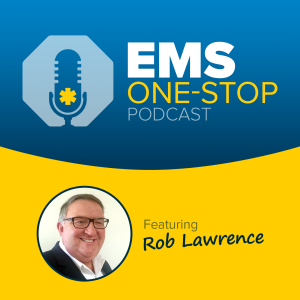
Thursday Apr 03, 2025
The human side of EMS: Culture, compassion and clinical courage
In this episode of EMS One-Stop, recorded live from the ABC 360 and XI Conference, host Rob Lawrence chats with keynote speaker Catherine Kuhlmann, a firefighter-paramedic with over 26 years of experience.
Kuhlmann discusses the importance of understanding both internal and external customer service in EMS, emphasizing the need for a healthy organizational culture to ensure the best patient care. She reflects on the profound impact that first responders can have on individuals, drawing from her own experiences and personal tragedies to highlight the emotional resilience required in the profession.
Rob also speaks with Page Wolfberg & Wirth’s PWW/AG Principal Doug Wolfberg, long-time EMS lawyer and educator, about lessons learned from working in and around law enforcement during patient care. Wolfberg provides actionable insights into how EMS professionals can better collaborate with police officers, ensuring that patient care remains a priority while navigating complex, high-stress situations.
Together, Kuhlmann and Wolfberg offer invaluable perspectives on fostering better patient advocacy, maintaining professional integrity and refining EMS protocols to adapt to new challenges.
MEMORABLE QUOTES
-
“How many careers, professions are there that, more often than not, you can make somebody's worst day their best?" — Catherine Kuhlmann
-
"If you want to know what's going on in your hospital, ask housekeeping. Patients will not remember that you worked your butt off for 45 minutes to restart their heart … but they will remember that you tucked their feet in with a blanket underneath it." — Catherine Kuhlmann
-
"You have to have a healthy department in order to continue to be healthy. And a lot of times when people think that they have problems with an individual and their agency, sometimes it’s not actually a problem with the individual, it’s with the agency." — Catherine Kuhlmann
-
"We have a duty to the patient. We're not there to help the police. We're there to advocate and treat the patient." — Doug Wolfberg
-
"EMS cannot subordinate judgement to law enforcement. If a police officer says give this guy some juice and put him to sleep, we first have to do an assessment and figure out if clinically that's the right thing." — Doug Wolfberg
ADDITIONAL RESOURCES
-
ABC 360 and XI Conference is Page Wolfberg & Wirth Advisory Group’s all-day workshop for EMS leaders, chiefs, HR managers and compliance professionals.
-
Vodcast: Lessons from the McClain case: Protecting first responders and improving EMS practices
-
Balancing care and collaboration: Key lessons from EMS and law enforcement interactions
TIMELINE
00:37 – Catherine Kuhlmann introduces herself, detailing her extensive background in EMS, law enforcement, and as a justice of the peace. Rob then highlights the key themes of Kuhlmann’s keynote speech, which revolves around the importance of understanding the "why" in EMS.
02:16 – Kuhlmann discusses the importance of organizational culture in retaining quality personnel and how many individuals leave — not due to the work itself — but because of the agency's culture. Kuhlmann talks about the personal fulfillment that comes from EMS work, sharing a story about a young girl she saved who later became a doctor.
06:13 – Kuhlmann introduces the concept of "Murphy," a problematic employee in the agency, and suggests that sometimes these individuals may reflect a deeper organizational issue.
08:12 – Kuhlmann emphasizes the importance of communication, advising that EMS leaders should hold honest, one-on-one conversations with problematic staff before resorting to exit interviews.
12:04 – Kuhlmann reflects on the small gestures that have a lasting impact on patients, highlighting how seemingly minor acts of compassion can leave a lasting impression.
14:03 – Rob and Kuhlmann discuss the concept of bedside manner in EMS, stressing the importance of treating patients with dignity and respect. Kuhlmann closes with a powerful message about EMS professionals’ responsibility to treat others’ families with the same care and respect as they would their own.
21:06 – Rob Lawrence introduces Doug Wolfberg, who returns to discuss lessons on collaborating with law enforcement in EMS.
22:05 – Wolfberg explains the need for scenario-based training in chaotic environments to build muscle memory and advocate for patients.
23:11 – Wolfberg discusses the importance of EMS maintaining independent clinical judgment, even when law enforcement may request specific actions.
24:03 – Wolfberg stresses the need for clarity in determining whether a patient is in custody and how this affects EMS protocols.
25:06 – Wolfberg explains the importance of advocacy in EMS, particularly in law enforcement scenarios, and the significance of body camera footage for ensuring accountability.
27:13 – Wolfberg shares the potential consequences for EMS professionals who fail to act empathetically or professionally, especially when caught on body camera.
29:15 – Wolfberg speaks about the future of ABC 360, including their upcoming conferences and certifications.
Previously on EMS One-Stop